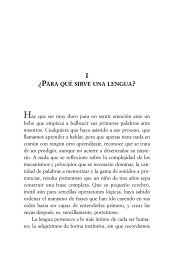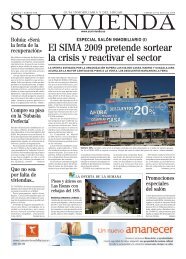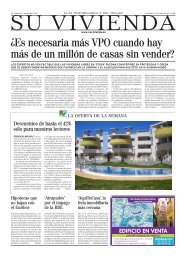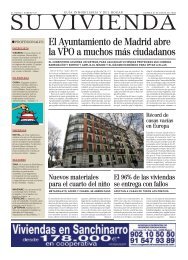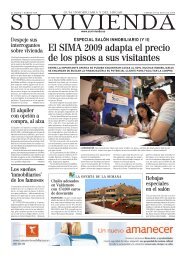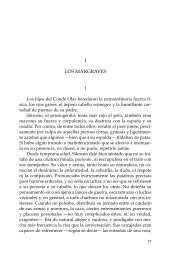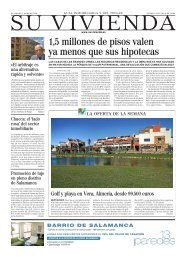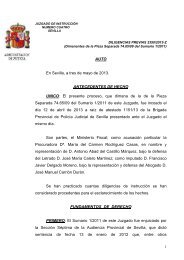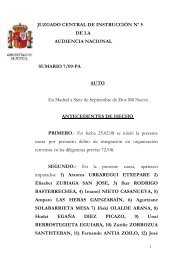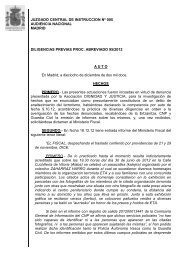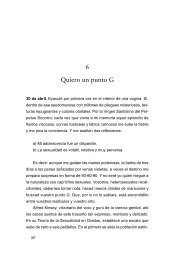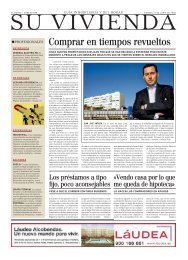UNIDAD 7: Spain, Europe and the World - El Mundo
UNIDAD 7: Spain, Europe and the World - El Mundo
UNIDAD 7: Spain, Europe and the World - El Mundo
You also want an ePaper? Increase the reach of your titles
YUMPU automatically turns print PDFs into web optimized ePapers that Google loves.
His Majesty <strong>the</strong> King of <strong>Spain</strong> - as<br />
Honorary President - <strong>and</strong> <strong>the</strong> Spanish<br />
Prime Minister chair this institution.<br />
Spanish in <strong>the</strong> <strong>World</strong><br />
Spanish in <strong>the</strong> <strong>World</strong> is <strong>the</strong><br />
title of <strong>the</strong> reports that <strong>the</strong> Instituto<br />
Cervantes has published each year<br />
since 1998. These reports are<br />
descriptive articles regarding <strong>the</strong> scope<br />
<strong>and</strong> importance of <strong>the</strong> use of <strong>the</strong><br />
Spanish language. These annual<br />
reports offer useful, <strong>and</strong> usually<br />
curious information on <strong>the</strong> reality of<br />
our language. Fur<strong>the</strong>rmore, you can<br />
find <strong>the</strong>m for free on <strong>the</strong> Internet.<br />
There are only 12 languages that exceed <strong>the</strong> 100 million speaker<br />
mark: M<strong>and</strong>arin Chinese, English, Spanish, Hindi, Bengali,<br />
Arabic, Portuguese, Russian, Urdu, Japanese, Punjabi <strong>and</strong><br />
German. According to <strong>the</strong>se studies, <strong>the</strong> number of Spanish<br />
speakers in <strong>the</strong> world is around 380 million people. It is <strong>the</strong> third<br />
language in <strong>the</strong> world in amount of speakers (after M<strong>and</strong>arin<br />
Chinese —885 millions— <strong>and</strong> English —440—) <strong>and</strong> in <strong>the</strong> amount<br />
of countries (about twenty) where it is <strong>the</strong> official language.<br />
Activities:<br />
1. Briefly describe <strong>the</strong> symbol of <strong>the</strong> Instituto Cervantes. What do you think it means?<br />
2. Find some more information about <strong>the</strong> Spanish language in <strong>the</strong> world. What data would<br />
you highlight? Do you think Spanish is an important language? Why?<br />
3. Research into <strong>the</strong> use of <strong>the</strong> Spanish language (also of o<strong>the</strong>r languages) on <strong>the</strong> Internet.<br />
Do you think <strong>the</strong> number of speakers is proportional?<br />
3. Spanish, <strong>Europe</strong>an <strong>and</strong> <strong>World</strong> Citizens<br />
In all <strong>the</strong> units we have studied, including this one, we have been looking at <strong>the</strong><br />
concept of citizenship as something personal: for us, that citizenship is Spanish. But<br />
citizenship cannot be limited; being a citizen means being open to o<strong>the</strong>rs, to o<strong>the</strong>r cultures,<br />
o<strong>the</strong>r communities. Spanish citizenship can only be understood if it is regarded as a<br />
<strong>Europe</strong>an <strong>and</strong> world citizenship. This is why we can say that we are Spanish, <strong>Europe</strong>an <strong>and</strong><br />
also cosmopolitan citizens.<br />
<strong>Europe</strong>an Citizenship: The <strong>Europe</strong>an Union <strong>and</strong> its Institutions<br />
The <strong>Europe</strong>an Union is not a federation like <strong>the</strong> United States, or<br />
a mere organ of cooperation among governments, like <strong>the</strong> United<br />
Nations. It is a unique social, political <strong>and</strong> cultural reality. Its Member<br />
States are still independent sovereign nations, but <strong>the</strong>y share <strong>the</strong>ir<br />
sovereignty in order to be stronger <strong>and</strong> have a global influence that<br />
none of <strong>the</strong>m could have in isolation.<br />
A shared sovereignty means that <strong>the</strong> Member States delegate<br />
some of <strong>the</strong>ir decisive powers to <strong>the</strong> common institutions with a view to<br />
taking joint decisions, always democratically, about matters of common<br />
interest.<br />
There are three main institutions in charge of taking decisions:<br />
The EUROPEAN PARLIAMENT, representing <strong>the</strong> citizens of <strong>the</strong> <strong>Europe</strong>an Union. It is<br />
directly elected by <strong>the</strong>m;<br />
The EUROPEAN UNION COUNCIL, representing <strong>the</strong> Member States; <strong>and</strong><br />
The EUROPEAN COMMISSION, defending <strong>the</strong> Union's interests as a whole.<br />
These institutions draw up <strong>the</strong> politics <strong>and</strong> legislations to be applied in <strong>the</strong> <strong>Europe</strong>an<br />
Union. The Commission proposes <strong>the</strong> new rules (in principle) <strong>and</strong> <strong>the</strong> Parliament <strong>and</strong> <strong>the</strong><br />
6



